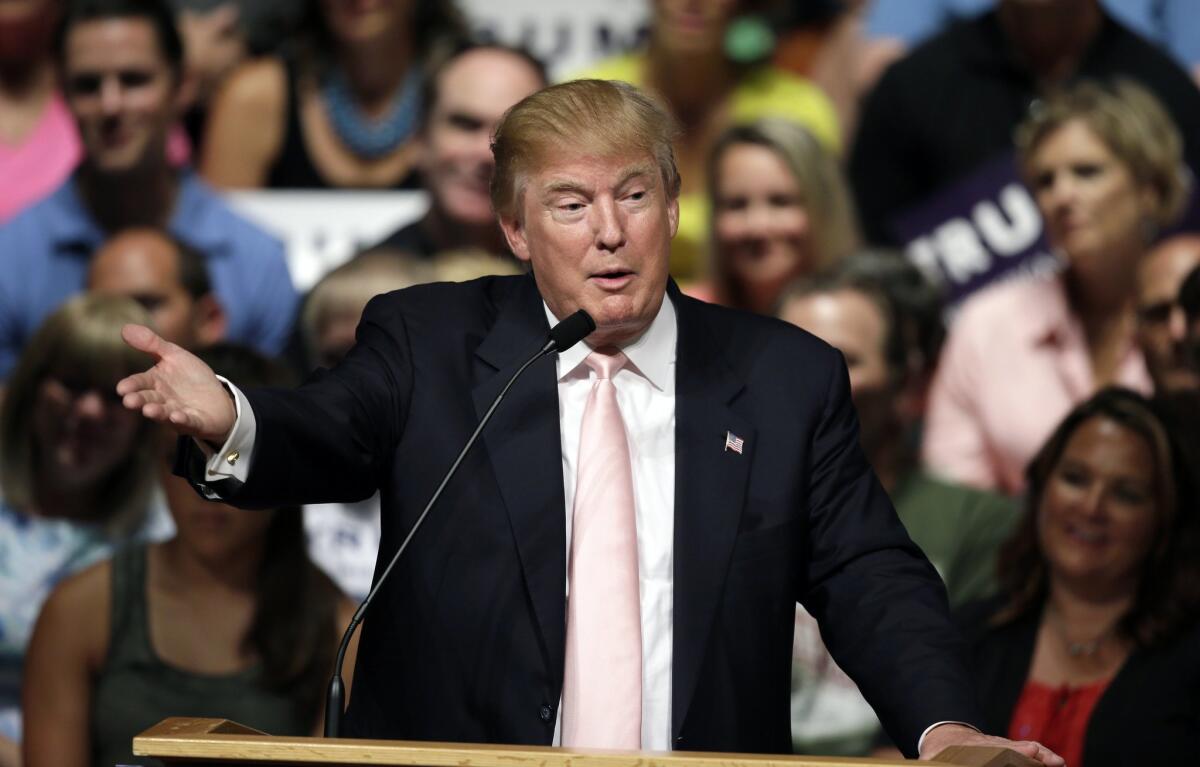Trump dominates the conversation but has done little to build support

Republican presidential candidate Donald Trump, seen last month in Oskaloosa, Iowa, has dominated both news coverage and social media conversations about the campaign, a new study finds.
- Share via
Reporting from Washington — Donald Trump has dominated the conversation about the presidential campaign, both online and in traditional media, but hasn’t done much to turn that attention into lasting support, a new analysis of social media traffic and news coverage found.
By contrast, Hillary Rodham Clinton, the Democratic front-runner, has established a formidable online presence that has used social media to amplify her message and enlist supporters, the analysis found.
Among Trump’s rivals in the GOP field, Sen. Ted Cruz of Texas has been effective in using social media, but he and all the other Republicans have been largely drowned out by Trump for much of the summer.
“Trump is making a lot of noise, but he’s not necessarily doing the work” that would be needed “to turn that share of voice into actual votes,” said Lara Brown, associate professor at George Washington University’s Graduate School of Political Management, a coauthor of the study.
Brown and her colleague Michael Cornfield have been working with Zignal Labs, an analytics firm, to study how news about political candidates echoes through both social media and traditional news sources.
Their most recent report, covering mid-June through mid-July, analyzed nearly 22 million news and social media mentions of candidates. The mentions include online news stories, tweets, blog posts, publicly available Facebook posts and references on other social media platforms such as YouTube.
Many critics, both within newsrooms and outside, have accused the traditional media of providing excessive coverage of Trump. But the study indicated that the public is even more focused than the media are on Trump.
The billionaire real-estate developer got about one-quarter of the mentions in traditional media, but 60% of the social media mentions during the month, the study found. Overall, about one-third of all mentions of the campaign, either in traditional media or social media, referred to Trump.
Trump “essentially muscled and stepped on and dominated the presidential conversation” during most of the time since his announcement in mid-June, Cornfield said.
One effect of Trump’s dominance was to stifle conversation about other candidates. Jeb Bush, the former Florida governor, has suffered particularly, the study found. Trump declared that he was running the day after Bush and in doing so, muffled the rise in attention that an announcement typically brings to a candidate.
Trump has managed to shift both the substance of the political conversation and the tone, the study found. On the substantive level, Trump made immigration, previously a minor topic of conversation in the campaign, into a leading topic.
The Trump effect also made the conversation less positive. Negative mentions of him outweighed positive ones. But the conversations that swirl around the candidates who have attacked Trump also grew more negative, Cornfield said.
By contrast, he said, the data indicate that the conversations around Clinton, Vermont Sen. Bernie Sanders and other Democrats have been largely positive.
Clinton has been particularly effective in using Twitter and other social media platforms to push her campaign message, the analysis found. A tweet last month in which her campaign touted her policies on global warming was retweeted 57,000 times, for example, a volume more than five times greater than any of her rivals’ messages.
The Clinton campaign has also been effective in getting people to refer to her campaign website, a technique campaigns can use to build lists of supporters and recruit volunteers. Sanders has also been effective in those efforts, although at a lower volume, the study found.
Trump, by contrast, has been among the least effective candidates in converting mentions into actions such as sharing a website address, Brown said. That’s an indication that his campaign remains largely a one-person show rather than an effort focused on long-term growth.
Clinton “is operating at a volume that no one else is getting, not even Trump,” she said.
Of course, that success is relative to the rest of the political world. The race for the White House received an average of about 14,000 mentions per hour during the period the group studied. That’s a lot, but it’s still less than peak attention for events like major sports contests.
The Kentucky Derby, for example, received 16,670 mentions per hour on race day, the report noted.
For more on politics and policy, follow @DavidLauter.
More to Read
Get the L.A. Times Politics newsletter
Deeply reported insights into legislation, politics and policy from Sacramento, Washington and beyond. In your inbox three times per week.
You may occasionally receive promotional content from the Los Angeles Times.











